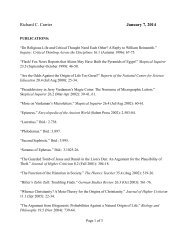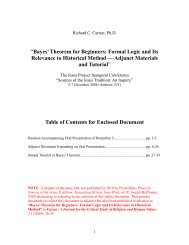Cultural History of the Lunar and Solar Eclipse in ... - Richard Carrier
Cultural History of the Lunar and Solar Eclipse in ... - Richard Carrier
Cultural History of the Lunar and Solar Eclipse in ... - Richard Carrier
Create successful ePaper yourself
Turn your PDF publications into a flip-book with our unique Google optimized e-Paper software.
astrologer declares that a lunar eclipse foretold anxiety (merimn€a). 145 The<br />
<strong>in</strong>consistency is typical <strong>of</strong> astrology, which generally played a Freudian association<br />
game with astronomical images, signs <strong>and</strong> concepts. But it is notable that <strong>the</strong> science<br />
<strong>of</strong> eclipses is used <strong>in</strong> <strong>the</strong> ‘art’ <strong>of</strong> astrology. The elite have <strong>the</strong>ir superstitions, too.<br />
C. Draw<strong>in</strong>g Down <strong>the</strong> Moon<br />
Oddly enough, <strong>the</strong> most fasc<strong>in</strong>at<strong>in</strong>g <strong>and</strong> notable response <strong>of</strong> <strong>the</strong> masses to <strong>the</strong> two<br />
k<strong>in</strong>ds <strong>of</strong> eclipse is found to follow not <strong>the</strong> solar but <strong>the</strong> lunar, <strong>the</strong> most common <strong>of</strong> <strong>the</strong><br />
two. We have no record <strong>of</strong> any ritual performed to ward <strong>of</strong>f eclipses <strong>of</strong> <strong>the</strong> sun (perhaps<br />
because <strong>the</strong>y were over too quickly to get anyth<strong>in</strong>g started), yet for whatever reason <strong>the</strong><br />
proper response to a lunar eclipse was to raise a clamor. Every observer who reports<br />
why <strong>the</strong> common people did this approaches <strong>the</strong> same reason: <strong>the</strong> clamor is <strong>in</strong>tended to<br />
prevent wizards from draw<strong>in</strong>g down <strong>the</strong> moon, ei<strong>the</strong>r by <strong>in</strong>terfer<strong>in</strong>g <strong>in</strong> <strong>the</strong> spell, or<br />
provid<strong>in</strong>g some k<strong>in</strong>d <strong>of</strong> magical re<strong>in</strong>forcement to <strong>the</strong> Moon’s own defenses.<br />
The basic descriptions are all similar. Tacitus records that <strong>the</strong> moon’s light is<br />
called back “through <strong>the</strong> r<strong>in</strong>g<strong>in</strong>g <strong>of</strong> bronze <strong>and</strong> <strong>the</strong> blast<strong>in</strong>g <strong>of</strong> horns <strong>and</strong> trumpets.” 146<br />
Marcus Manilius throws a related comment <strong>in</strong>to his poem as he describes how a lunar<br />
eclipse appears first to Eastern nations, s<strong>in</strong>ce <strong>the</strong> moon descends westwardly <strong>in</strong>to<br />
Earth’s shadow. S<strong>in</strong>ce <strong>the</strong> eclipse has already begun <strong>in</strong> <strong>the</strong> East, he notes, “<strong>the</strong> bronze<br />
is struck late <strong>in</strong> Western nations.” 147 Plutarch records that “<strong>the</strong> Romans, as was <strong>the</strong>ir<br />
custom, tried to recall her light with <strong>the</strong> clash<strong>in</strong>g <strong>of</strong> bronze <strong>and</strong> by hold<strong>in</strong>g up to heaven<br />
many burn<strong>in</strong>g fire-br<strong>and</strong>s <strong>and</strong> torches.” 148 This detail is unique <strong>in</strong> Plutarch, but appears<br />
aga<strong>in</strong> <strong>in</strong> a medieval account, for this practice persisted long after <strong>the</strong> dom<strong>in</strong>ance <strong>of</strong><br />
Christianity, attest<strong>in</strong>g to its appeal. The n<strong>in</strong>th-century Christian observer Rabanus<br />
Maurus reports 149 <strong>the</strong> bellow<strong>in</strong>g <strong>of</strong> horns, <strong>and</strong> people grunt<strong>in</strong>g like pigs, hurl<strong>in</strong>g spears<br />
or arrows, rais<strong>in</strong>g fires skyward, <strong>and</strong> even <strong>the</strong> hack<strong>in</strong>g <strong>of</strong> hedges <strong>and</strong> break<strong>in</strong>g <strong>of</strong> plates,<br />
<strong>and</strong> all, <strong>the</strong> locals say, to scare away <strong>the</strong> monsters who were eat<strong>in</strong>g away <strong>the</strong> moon.<br />
This is apparently a world-wide practice, dubbed <strong>the</strong> ‘moon monster’ myth, which Tylor<br />
catalogues (pp. 328-35).<br />
The elder Pl<strong>in</strong>y gives some details <strong>of</strong> <strong>the</strong> history <strong>of</strong> <strong>the</strong> practice <strong>in</strong> his own time.<br />
He expla<strong>in</strong>s that <strong>the</strong> commons are “terrified <strong>of</strong> crimes or someone’s death” when stars<br />
fail, <strong>and</strong> are worried about <strong>the</strong> moon’s own death at <strong>the</strong> h<strong>and</strong>s <strong>of</strong> evil potion (veneficia)<br />
<strong>and</strong> “because <strong>of</strong> this come to her aid with a discordant rattle.” 150 This “evil potion” is<br />
given a more detailed explanation by Pl<strong>in</strong>y at ano<strong>the</strong>r place, where he provides some<br />
145 Préaux, p. 124.<br />
146 Annals, 1.28: aeris sono, tubarum cornumque concentu strepere.<br />
147 Astronomica, 1.226.<br />
148 Aemilius Paulus, 17.8: t«n d¢ ÑRvµa€vn, Àsper §st‹ nenoµisµ°non, xalkoË te patãgoiw<br />
énakalouµ°nvn tÚ f«w aÈt∞w ka‹ purå pollå dalo›w ka‹ d&s‹n énexÒntvn prÚw tÚn oÈranÒn.<br />
149 Homilies, 42.<br />
150 Natural <strong>History</strong>, 2.9 (54): <strong>in</strong> defectibus siderum scelera aut mortem aliquam pavente...aut <strong>in</strong> lunae veneficia<br />
arguente mortalitate et ob id crepitu dissono auxiliante. To which Pl<strong>in</strong>y reacts with great praise for “philosophy”<br />
which, by underst<strong>and</strong><strong>in</strong>g <strong>the</strong> ordo naturalis, had “saved” mank<strong>in</strong>d from this superstition.








